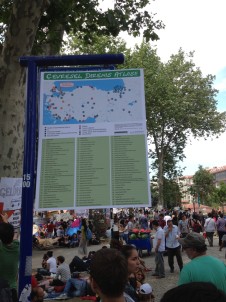
Environmentalists have been protesting for months against a plan to swap trees for a shopping mall in Gezi Park at Istanbul’s Taksim Square. When riot police chased them away, the conflict spread like wildfire to dozens of cities in Turkey and to almost all its regions. In no time, the reasons to hit the streets went from trees to policy brutality and to a set of grievances against Prime Minister Erdogan. Our EJOLT partner in Istanbul is active in Gezi Park, linking the struggle for trees there with many other cases of environmental conflict elsewhere in the country (see the picture of the map they put up in Gezi Park). And while EJOLT collaborators are writing a background article that puts the focus on the environmental justice aspect of this popular uprising, we’ve already selected a few voices on Turkey’s ‘tree revolution’:
“The resistance to the obliteration of Gezi Park is not an isolated event but links to decade-long Turkish protests against the establishment of gold and coal mines, hydroelectric plants and urban transformation projects that have spawned seemingly uncontrolled construction and development. Laws designed to protect the environment have been systematically undermined. … What Gezi Park demonstrates, however, is that the need for thriving urban green spaces is not just essential for human well-being but also for peace and social order. Just as lack of access to food, water, energy and housing may serve as a social tipping point for violence and unrest, so may lack of access to nature within the city, the latter compounding the misery of material deprivation with the depressed monotony of tarred roads, smoke-stained buildings and the sickening artificialism of the shopping mall.” – Tracy Humby
Tracy Humby is an associate professor of law at the University of the Witwatersrand. You can read her full article here.
“The turmoil started a week ago as a small environmental protest in an Istanbul park against redevelopment plans, but quickly mushroomed into huge weekend clashes with riot police in the city and across half the country after police mounted tear gas and water cannon attacks on peaceful civilians. The focus of the protest shifted from the building project to the person of the prime minister.” – The Guardian
“Maybe it is not a Tahrir or Plaza Catalunya moment for Turkey yet but today the encampment and popular struggle for Taksim Gezi Parkı can be read as something more than a call to protect a public park solely. It is probably the most visible manifestation of on-going ecological conflicts and thus ecological resistance, which often passes unnoticed in international appraisal of Turkey’s developmentalist economic “miracle” (Sachs, 2013). These struggles often appear as popular resistance against privatization of rivers for hydropower (Islar, 2012), resistance against construction of coal-fired power plants claiming to end foreign oil dependency (Walker and Hartley, 2012), resistance against mining projects in critical ecosystems (Avcı et al. 2010) or yet to a much lesser extent – unfortunately – as the refusal of developmentalism a-la-turca in general (Arsel, 2012).” Ethemcan Turcan
Ethemcan Turcan is a Ph.D. Candidate at Autonomous University of Barcelona. You can read his full article here.
“Reducing the crowd’s concerns to environmental ones seemed destined to portray these protesters as marginal and weaken their ability to reach a wider audience. Since the prime minister broke cover to address the fact of the protests, this has become an explicit tactic. … His insistence that this was a spat over a discrete number of trees in a park shows this rhetorical strategy at work: “Nobody has the right to protest against law and democracy, hurting others and increasing tensions for the sake of a few trees,” he said on the 1st of June. … Not only had a wider spread of grievances coalesced around the initial issue … but even the very evident and committed tree-hugging in the square was misleading when taken out of context. In a city of nightmare urbanization like Istanbul, determined attempts to replant the uprooted trees of Gezi Park constituted a stand, not just against the city’s 109th shopping mall, but against impunity and corruption and the privatization of public space without consultation. “Trees” didn’t cover it. – Salon.com

The project ENVJUSTICE has received funding from the European Research Council (ERC) under the European Union’s Horizon 2020 research and innovation programme (grant agreement No. 695446)